- Home
- Roger Zelazny
The Black Throne Page 11
The Black Throne Read online
Page 11
* * *
Edgar Allan Poe's sleep was troubled. He woke early and tried unsuccessfully to recollect what he had dreamt. Finally, he rose and dressed himself. The sky was just growing pale to the east, and he opened the front door and stepped outside to consider the dawning.
He beheld a miniature castle sparkling in the front yard. He moved toward it and it dissolved. There was only a heap of sand when he reached the spot it had occupied.
Some trick of the light perhaps... .
VI
She walked barefoot on the beach. It was a still, starless night. The sea itself glowed faintly, however, sufficient to provide what small illumination she required.
She walked in a circle, passing near the water and away from it. She could not remember why she did this, but she did remember that it was important. So she continued.
At one point a black cat hurried past her, at another a pit opened at the center of her circle. Flames leapt about it now, and a bright blade passed among them. She continued walking. Why was she doing this? It was important, that was why. Oh, yes.
A man lay prone beside the pit. Yes. He must be made to look into it. That's right. Easily done. Advance the flames. Yes. See him move?
She moved faster. And what does he behold? The horror. Of course. What he sees is—
She screamed and the sea rose up, reaching for the flames, the man, the pit—
She threw her hands wide and the fabric of space was torn. She stepped through the opening.
* * *
I opened my eyes to the steady jouncing of the coach, and the black cat stared back at me from the shadowy corner of the seat opposite. I watched it for perhaps ten seconds as my senses returned to me, and then I realized that I beheld Peters' wig which had slipped from his head as he dozed across the way.
I rubbed my eyes, sat up, and sought the water bottle. I drew the blanket upward from my lap to cover my chest as well. I took a drink, and then another.
We had been traveling in a series of hired coaches, pulled by relays of horses, for the better part of November. The Pyrenees had been awful and Navarre had been bleak. Just when I was beginning to obtain the rudiments of French I had to start all over again with Spanish. Peters again had the advantage of me, from times spent in Mexico, but as he explained, "It's all gutter Spanish, Eddie. No selfrespecting caballero 'ud want to hear it in public—and believe me, they're all self-respecting.
"In public," he added.
Now I saw burnt fields, burnt houses, wooden crosses. The unmistakable ravages of war lay all about us.
We had recently begun experiencing delays and other difficulties because of the conflict, but timely guidance from Valdemar and a good supply of gold coin kept us going. As a soldier, I was both fascinated and appalled. The Spanish had come up with a new word for the form of warfare by means of which they continued to resist the French—guerrilla. It involved hit and run skirmishing, ambushes, attacks behind the enemy lines. The Spaniards refused to stand and fight a pitched battle, and it was working against the French now as it had earlier in the century. It was costing the French too much. It was wearing them down.
I turned my gaze away from the depressing landscape. A little later the coach was suddenly jounced and our pace increased. I heard an annoyed "Rawk!" from among the overhead baggage and Grip fluttered down to pick at Peters' wig. The bird had apparently grown tired of Dupin's tutelage and fled from his house on the occasion of our last visit, appearing in the rigging of the Eidolon at quayside and greeting me with a cheerful "Vingt francs pour la nuit, monsieur" when I came topside following my interview with Valdemar.
Grip obviously wanted our attention because he did not approve of the driving. He always acted this way when Emerson seized the reins and drove the horses to a frenzied pace. The driver was loath to dispute matters with the simian, and what normally followed was that Ligeia was called upon to calm the horses mesmerically. Then Peters had to recover the reins from the ape and scold him a bit.
"Hey now, Grip! Give it back!" I heard him suddenly cry, and some sort of tussle ensued involving the hairpiece. This caused Ligeia to stir at my side and raise her head, taking a weight off my shoulder.
She yawned delicately and said, "Is he at it again?"
I nodded.
We were careening from side to side as well as bouncing when she stretched. Peters tickled the bird under his beak with one of his inhumanly thick fingers and composed his features into a frightful grimace which on anyone else would have been a slight smile.
"'At's a good Gripper," he said. "Let 'er go for Uncle Petey."
Grip saw fit to comply, and Peters immediately restored the wig to his pate, careless of the position it fell to occupy. Ligeia rose, leaning against the inside wall of the coach, parted the heavy drape on that side, hung out the window and gestured. Immediately, we began to slow.
"Might toss in a couple of heavy ones for Emerson," I muttered.
She winked back at me and leaned even farther. I caught hold of her about the waist. A half-minute later she signaled for me to help her return to her seat.
"My turn," Peters said, rising to his feet.
"Not necessary," she responded. "He has surrendered the reins to the driver."
"That ain't like him," Peters observed.
She shrugged.
"L'ennui, perhaps," she suggested.
"Oh, sure," Peters said, and he seated himself. After a time he began playing with Grip again. "Say
'Nevermore!' " he coaxed. "That's wot the gennleman in Paris wanted you to say. C'mon! Let's hear it!"
"Amontillado!" the sable creature screamed. And again: "Amontillado!" He finished with a burst of maniacal, almost-human laughter, followed by the sound of a cork being drawn from a bottle, this last was repeated many times in quick succession.
"I do believe that's a type of strong drink," Peters observed, squinting at me. "Ain't it?"
"Aye," I replied, my mind wandering ahead.
I wondered exactly what I was to do once we reached Toledo. Valdemar had given us no assurance that Von Kempelen was actually there—only that this was the right trail for me to follow to my ultimate goal of freeing Annie.
"Nevermore," Peters said softly.
"Amontillado," Grip insisted.
* * *
The day before we reached Toledo there came a rapping from overhead. In that Emerson lay curled at Peters' feet sleeping soundly (a frequent occurrence these days, with a little help from others), we assumed it was the driver signaling to us. Peters leaned out and hailed him on this account, but the man denied it.
The rapping came again, and Ligeia turned and studied me. "You have not been with the mesmerism making, have you?" she inquired.
"Me? No. Not in a long while," I responded.
"I feel something strange," she said then. Then she was calling out the window to the driver. We began to slow.
"What is it?" I asked.
"Most unusual," she said.
We came to a halt beneath a large tree. She ordered then that Valdemar's wine crate be unstrapped and lowered to the ground. Then she told the driver and his assistant to take a break, somewhere beyond the hill. Peters elected to join them. It was a strange sensation that overtook me then, because I heard the rapping again—from inside the crate.
"Open it," she instructed me.
I undid a final fastening and raised the upper portion of the lid. Both irises visible, Valdemar stared up at us.
"Worse and worse," he observed.
"What is it?" Ligeia asked.
"I come to you without being summoned. Could it be that the Life Force gains ascendancy?"
"I could not say," she answered. "Do you know why whatever brings you here has done so?"
His right hand moved, falling upon my own where I leaned on the edge of his casket. It took considerable effort of will for me not to draw away.
"You must part company with the others," he said, "before entering the city. If you do not, they will die in Toledo."
"What are we to do while he is within?" she asked.
"Turn and head east," he replied. "Query me again at sundown."
"I do not understand what I am supposed to do in Toledo," I stated.
"Neither do I," he said, his hand tightening on mine. "Something summons. You may answer it or not, as you choose. Your will is free."
"I must go," I said.
"I knew you would," he replied, and he slumped back, his hand sliding free of my own and falling back perfectly into place upon his breast.
Ligela motioned for me to close the casket, which I did. She took my arm and walked with me among a stand of saplings.
"I do not like this at all," she said. "It smacks of—interference. It may be a cosmic stroke of good fortune. It may be a trap. There is no way for me to tell in advance."
"What are we to do?"
"I wish to place you under control," she said, halting within the grove, "and to create a psychic bond."
"Remember what happened the last time you worked on me?"
"I have given it considerable thought since then," she told me. "This time you will not be evicted from your body."
"What will be the purpose of this—bond?"
"Hopefully, it will keep me apprised of your welfare," she explained.
"All right," I said.
I seated myself upon a gray log, my back against a boulder, at her direction. I remember the sweep of her hands past my eyes and a buzzing below my stomach. The plug of my mind was drawn and my thoughts drained away... .
How much later it was that I awoke I do not know. I felt very relaxed.
"Good," I heard her say. I opened my eyes, she smiled, extended her hands, and helped me to my feet.
"Did it work?" I asked as we walked back to the coach.
"I think so," she said. "We shall see."
The others were waiting when we got there, and we raised Valdemar and strapped him into place.
As we rode along, I wondered: Even if she became aware of some peril I faced, what would Ligeia be able to do about it, way off somewhere to the east? I studied Grip, who returned my gaze. He opened his beak several times, but said nothing.
* * *
Toledo stood on a hill, the Tagus river bent three-quarters of the way about it. It was situated some forty miles southwest of Madrid in an area not currently held by the French. Dark clouds hung above the city, and the ground was damp—as if we had just missed a storm. Our current coachman—older than most of the others—halted us outside the city walls, vowing he would only set foot or wheel within the place sometime between the freezing of hell and the Second Coming.
I took with me a goodly amount of gold, and a note Ligeia had written in Spanish indicating I wished to hire an interpreter. I had the name of a Padre Diaz Valdemar had assured us to be an honest and honorable man, and I had a rough map indicating the location of his church, Santo Tome, and its rectory.
Armed with these I bade my companions good-bye, tentatively planning to meet them in this same spot at this same time three days hence.
So I approached the fortress on the rock from its northern flank. I knew that the Romans, the Visigoths, and the Muslims had dwelled here. Ligeia had told me that its cathedral was a thing of exquisite beauty, dating back to the thirteenth century; and while I would have enjoyed viewing it under other conditions I heard Time's heavy tread, slightly faster than my own, somewhere in back of me.
I entered the city without being challenged. Apart from his non-physical insights, Valdemar was probably correct from a more practical point of view in suggesting that I separate from my escort of friends and allies outside the walls. Loyal and strong they might be, but they were also a somewhat odd assortment of people and creatures, and in time of war the political and religious arch-conservatives who ruled here were apt to be intolerant. As a wealthy American I could hope at least to be tolerated.
I did get a view of the cathedral, and of many little shops, and some fine residences, and some gilded coaches, and some dirty wagons, and some truly lovely horses, and some excellent examples of the damascened blades for which the city was famous. One of the most gorgeous was a dagger in the hand of the man who arrested me.
Four armed men of particularly uniform appearance approached me just as I succeeded in locating Santo Tome. I had been wandering the streets for a couple of hours by then and was rather pleased to have located the church without assistance other than the map. In fact, I was still holding the thing in my hand when they came up to me and began saying graceful and incomprehensible things.
"No comprendo," I explained. "Soy norteamericano."
They said more things to each other, then one of them looked at my map, pointed to it, and pointed to the church.
"La iglesia?" he asked.
"Si," I replied. "Santo Tome. De donde es Padre Diaz?"
They conferred again quickly, and when I heard Padre Diaz' name mentioned in close conjunction to another word I had committed to memory—that being "heretico"—I suspected I was in trouble. Nor was I incorrect. It was but moments later that I was given the opportunity to admire the gold and silver inlay of the dagger. There were several others in evidence, but the one belonging to Enrique—also referred to as "Jefe" by the others—was by far the most attractive.
"You—come—with—us," Jefe Enrique said to me.
"Soy norteamericano," I explained again.
"Si, norteamericano amigo de heretico," he said.
"No," I said. "I wanted help in finding an inventor named Von Kempelen. I was told that Father Diaz either spoke English or could find me an interpreter. See?"
I showed him the letter. He passed it to one of the others. The man glanced at it and handed it to the next man, who did the same. It occurred to me then that all four of them might be illiterate.
"Por favor," I said. "Interpreter, translator—para Ingles."
Jefe Enrique shrugged and gestured with his blade.
"Come," he said.
Two of them flanked me, one walked behind, Jefe walked a bit ahead and to the right. I regretted not having learned the Spanish word for "misunderstanding" though I doubted it would really have done me much good. There was a certain air of dedication about them which did not seem to lend itself to debate.
And so I was taken to the local jail, my money and blade confiscated along with my letter and map. I was locked into a pitch-dark cell, presumably while it was considered whether I might be an accomplice of poor Padre Diaz. If they decided this to be the case, presumably I would be handed over to the Inquisition.
* * *
Extending my hands before me, I moved slowly, groping my way about the circuit of my confining walls, some of them stone and some rough iron. When I felt myself to be at the door once more I seated myself with my back to it and rested. I ate some bread and drank some water that I found there. I must have dozed then, for there seemed to be a break in my consciousness.
Upon awakening, I found myself sprawled prone, my right arm hanging downward. My cheek rested upon the floor of the prison, but my temple did not. A peculiar smell, as of decayed fungus, arose to my nostrils. I moved my arm about and came by degrees to realize that I had somehow come to rest at the very brink of a circular pit. I groped about until I located a loose piece of masonry which I managed to pry free. Letting it fall, I listened to its clinking against the edges of the chasm until at length it plunged into water. At that instant a door or panel was opened somewhere overhead and closed again. In the instant's illumination this afforded I was able to ascertain the good fortune which had permitted me to fall just as I had rather than a half-pace, say, farther ahead. It was a large circular pit, occupying the center of the cell. I withdrew immediately to the nearest wall, pressing myself firmly against it.
We seem to be entombed alive, Perry. It was almost as if Poe had spoken, as if he were seated beside me there in the dark, contemplating the abyss.
So it would seem, Poe. But it's only a jail. I've been in them
before, I responded in thought.
Not like this one, Perry.
Embellishments, my dear Poe. Mere embellishments.
The pit calls to us.
Let it call. I'm not inclined to respond.
You're made of sterner stuff than myself, Perry.
Not so, Poe. We are the same—somehow. Circumstances have but provided—embellishments.
Perhaps it would be better to plunge into the thing and get it over with.
No thanks.
Everything ends in the abyss, anyhow.
No reason to rush things. Make it wait.
It does not know waiting. It is not sentient.
Then we are superior to it, for we are.
Sounds vaguely like something Pascal once said.
So it does.
Such philosophy from a man of action!
I'd a decent enough education, and I usually have a book about.
What's become of us?
We got switched.
I don't understand.
I don't know the precise mechanics of it, but we wound up in each other's world. It had to do with a misuse of Annie's power.
Silence. Three beats. Three more.
Then, Or are we but a dream, Perry, in the mind of some demon? And is that demon myself?
Against solipsism I have no arguments. Nobody ever succeeded as well as Hume in proving the unreality of the real. But as he himself said of Berkeley, such arguments admit of no answer and produce no conviction.
You are myself, my doppelganger, my dark other. We are opposing halves of the same spirit, to contradict so perfectly.
We're not that different, Poe. It's just the words that get in the way.
He chuckled.
More than ever I see this as unreal, he replied, as a dialogue between the two spirits within me.
What can I say?
Nothing, I suppose. Either that, or agree with me.
I will always maintain that it's better to have been than not to have been—even though it's only a feeling.
There came a clinking sound and a brief bit of light from the vicinity of the door, off to the left, just enough light to show that a tray bearing a piece of bread and a small flask had been pushed into the cell through a hinged opening at the door's bottom.

 Seven Tales in Amber
Seven Tales in Amber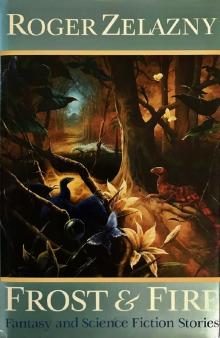 Frost and Fire
Frost and Fire Doorways in the Sand
Doorways in the Sand Unicorn Variation
Unicorn Variation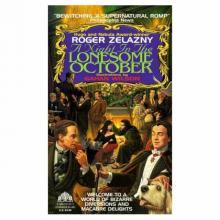 A Night in the Lonesome October
A Night in the Lonesome October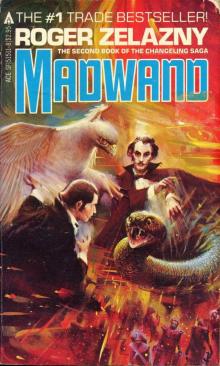 Madwand
Madwand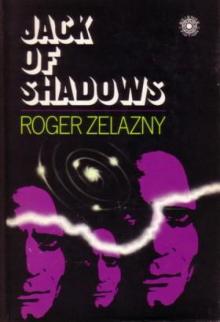 Jack Of Shadows
Jack Of Shadows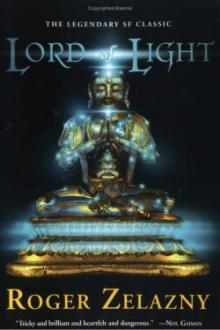 Lord of Light
Lord of Light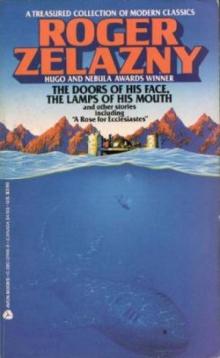 The Doors of His Face, The Lamps of His Mouth and Other Stories
The Doors of His Face, The Lamps of His Mouth and Other Stories Guns Of Avalon tcoa-2
Guns Of Avalon tcoa-2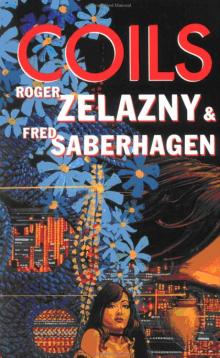 Coils
Coils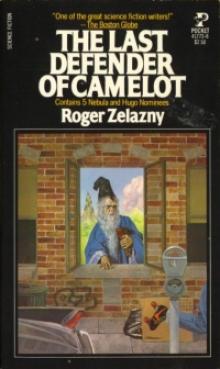 The Last Defender Of Camelot
The Last Defender Of Camelot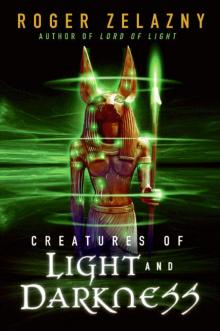 Creatures of Light and Darkness
Creatures of Light and Darkness This Immortal
This Immortal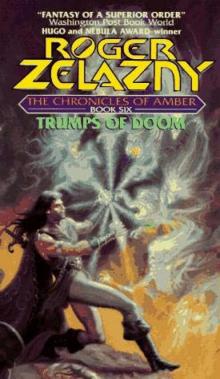 Trumps of doom tcoa-6
Trumps of doom tcoa-6 The Dream Master
The Dream Master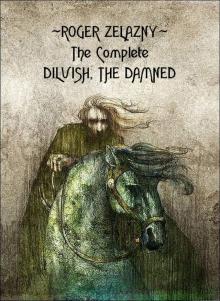 The Complete Dilvish, The Damned
The Complete Dilvish, The Damned Nine Princes in Amber
Nine Princes in Amber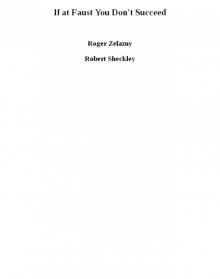 If at Faust You Don't Succeed
If at Faust You Don't Succeed Here there be dragons
Here there be dragons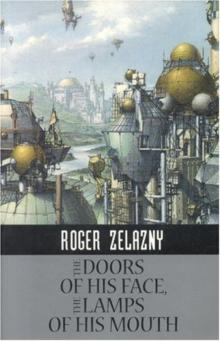 The Doors Of His Face, The Lamps Of His Mouth
The Doors Of His Face, The Lamps Of His Mouth The Great Book of Amber - Chronicles 1-10
The Great Book of Amber - Chronicles 1-10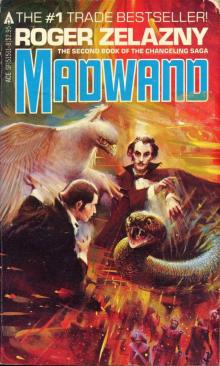 Madwand (Illustrated)
Madwand (Illustrated)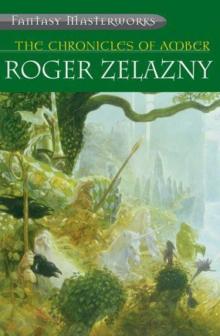 The Chronicles of Amber
The Chronicles of Amber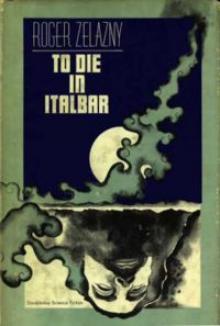 To Die In Italbar
To Die In Italbar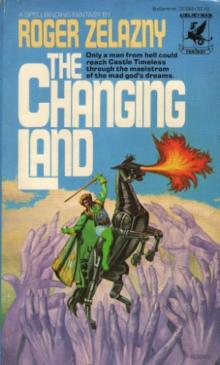 The Changing Land
The Changing Land The Furies
The Furies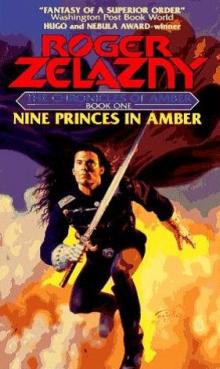 Nine Princes In Amber tcoa-1
Nine Princes In Amber tcoa-1 Last Of The Wild Ones
Last Of The Wild Ones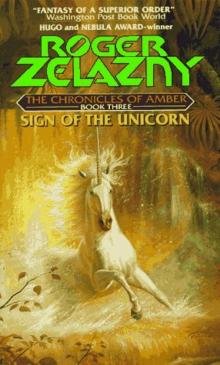 Sign of the Unicorn tcoa-3
Sign of the Unicorn tcoa-3 My Name is Legion
My Name is Legion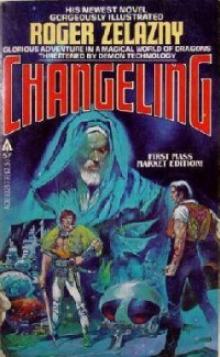 Wizard World 1: Changeling
Wizard World 1: Changeling Changeling
Changeling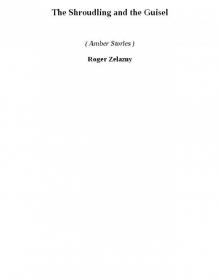 The Shroudling and the Guisel (amber stories)
The Shroudling and the Guisel (amber stories)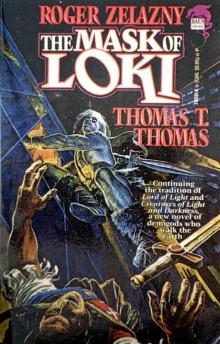 The Mask of Loki
The Mask of Loki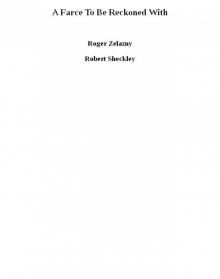 A Farce To Be Reckoned With
A Farce To Be Reckoned With Roadmarks
Roadmarks When Pussywillows Last in the Catyard Bloomed (rtf)
When Pussywillows Last in the Catyard Bloomed (rtf) Hall of Mirrors (amber stories)
Hall of Mirrors (amber stories) Permafrost
Permafrost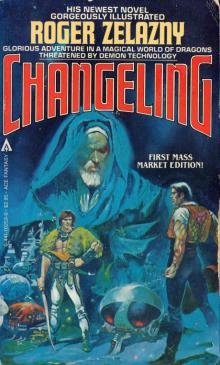 Changeling (Illustrated)
Changeling (Illustrated)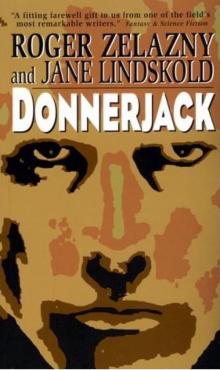 Donnerjack
Donnerjack Shadows & Reflections: A Roger Zelazny Tribute Anthology
Shadows & Reflections: A Roger Zelazny Tribute Anthology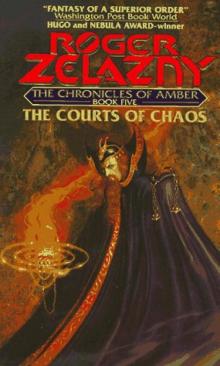 The Courts Of Chaos tcoa-5
The Courts Of Chaos tcoa-5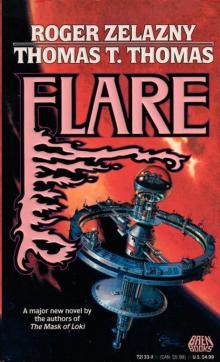 Flare
Flare Doorsways in the Sand
Doorsways in the Sand The Great Book of Amber
The Great Book of Amber Home Is the Hangman
Home Is the Hangman For a Breath I Tarry
For a Breath I Tarry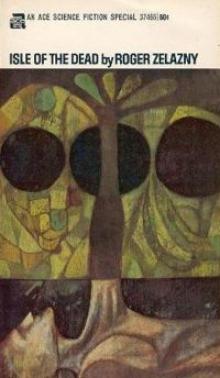 Isle Of The Dead
Isle Of The Dead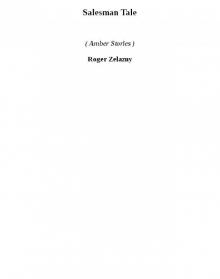 Salesman Tale (amber stories)
Salesman Tale (amber stories) Dismal Light
Dismal Light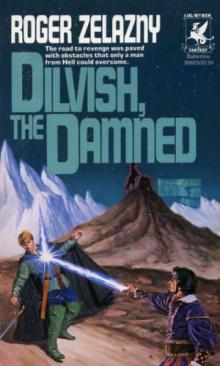 Dilvish, The Damned
Dilvish, The Damned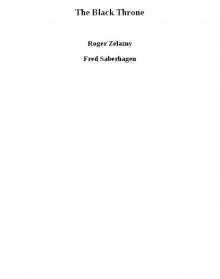 The Black Throne
The Black Throne Wizard World 2: Madwand
Wizard World 2: Madwand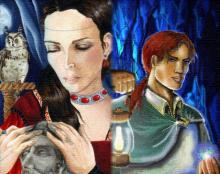 The Salesman's Tale
The Salesman's Tale